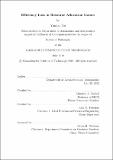Efficiency loss in resource allocation games
Author(s)
Xu, Yunjian
DownloadFull printable version (797.5Kb)
Other Contributors
Massachusetts Institute of Technology. Dept. of Aeronautics and Astronautics.
Advisor
John N. Tsitsiklis.
Terms of use
Metadata
Show full item recordAbstract
The overarching goals of this thesis are to quantify the efficiency loss due to market participant strategic behavior, and to design proper pricing mechanisms that reduce the efficiency loss. The concept of efficiency loss is intimately related to the concept of "price of anarchy," which was advanced by Koutsoupias and Papadimitriou, and compares the maximum social welfare with that achieved at a worst Nash equilibrium. This thesis focuses on the following two topics: (i) For a market with an arbitrary number of participants, how much is the Nash equilibrium close, in the sense of price of anarchy, to a social optimum? (ii) For a resource allocation/pricing mechanism, is the social welfare achieved at an economic equilibrium asymptotically optimal, as the number of market participants goes to infinity? Regarding the first topic, we quantify the efficiency loss in classical Cournot oligopoly games, where multiple oligopolists compete by choosing quantities. We also compare the total profit earned at a Cournot equilibrium to the maximum possible total profit that would be obtained if the suppliers were to collude. For the second topic, related to the efficiency in large economics, we analyze the efficiency of Kelly's proportional allocation mechanism in large-scale wireless communication systems. We study a corresponding Bayesian game in which each user has incomplete information on the state or type of the other users, and show that the social welfare achieved at a Bayes-Nash equilibrium is asymptotically optimal, as the number of users increases to infinity. Finally, for electricity delivery systems, we propose a new dynamic pricing mechanism that explicitly encourages consumers to adapt their consumption so as to offset the variability of demand on conventional units. Through a dynamic game-theoretic formulation, we show that the proposed pricing mechanism achieves social optimality asymptotically, as the number of consumers increases to infinity.
Description
Thesis (Ph. D.)--Massachusetts Institute of Technology, Dept. of Aeronautics and Astronautics, 2012. Cataloged from department-submitted PDF version of thesis. This electronic version was submitted and approved by the author's academic department as part of an electronic thesis pilot project. The certified thesis is available in the Institute Archives and Special Collections. Includes bibliographical references (p. 167-176).
Date issued
2012Department
Massachusetts Institute of Technology. Department of Aeronautics and AstronauticsPublisher
Massachusetts Institute of Technology
Keywords
Aeronautics and Astronautics.